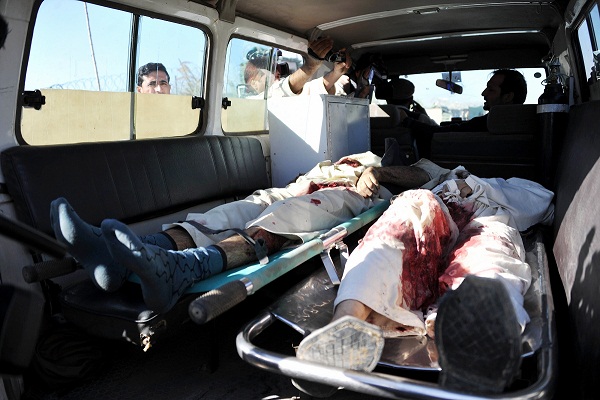In March, the Afghan government declared victory over “Islamic State,” but the group’s recent gains in eastern Afghanistan reveal a different story. The locals tell DW the situation in Nangarhar is extremely volatile.
According to media reports, hundreds of people in the eastern province of Nangarhar have been displaced after days of heavy fighting between IS militants and government troops.
The clashes began on Friday, June 24, when IS-affiliated jihadists attacked an army checkpoint in the province’s Kot district.
“More than 160 ‘Islamic State’ militants have been killed,” said Attaullah Khugyani, spokesman for the governor of Nangarhar.
“IS militants also set fire to 90 houses that belonged to residents of the district,” Khugyani said. He claimied the government had pushed the militants back.
But Omid Deedar, DW’s correspondent in Nangarhar, says the situation is still extremely volatile in Kot.
“Many villagers have fled their homes, leaving everything behind, as IS fighters have taken control of the area,” Deedar said. IS fighters were punishing the locals for supporting the government, he added.
“When the troops failed to push IS back, some local residents came out in the government’s support. Now the IS fighters are taking revenge,” Hekmatyar, a 19-year-old Kot resident, told DW.
“The IS fighters have even killed infants,” Hekmatyar added.
The provincial government claims only six civilians have been killed as a result of the fighting in Kot, but the locals say the numbers are much higher.
“We have lost everything. Our homes, our livestock and everything else has been taken from us,” said one woman who had to flee her village in the aftermath of the IS attacks.
Is Kabul downplaying IS threat?
In March, Afghan President Ashraf Ghani declared victory over IS following a months-long military operation. According to US military estimates, no more than 3,000 IS fighters reside in Afghanistan, mostly believed to be confined to a border region near Pakistan. Both Kabul and Washington consider the Taliban to be a bigger security threat than IS.
But the situation in Nangarhar indicates that IS is gaining ground in the war-torn country and that the Afghan government may be underestimating the group’s strength.
IS, which controls vast swathes of territory in Iraq and Syria, is recruiting a large number of fighters in Afghanistan. Many of these belong to the Taliban’s splinter groups. Security analysts fear that Taliban factionalism could lead to more defections of frustrated militants to IS.
The two groups are on hostile terms with each other, despite the fact that both are dominated by Sunni extremists.
“IS remains the major problem for the Taliban movement. It is gaining strength and the Taliban infighting will help this process,” Siegfried O. Wolf, a Brussels-based South Asia researcher, told DW.
Regional cooperation
But Wahid Mazhda, an expert on the Taliban in Kabul, believes that, while IS could recruit some fighters from small Islamic groups in Afghanistan, it is unlikely that the group could attract a large following in the region.
“IS and the Taliban are very different ideologically and culturally. In Pakistan, however, they could find some supporters, and they already have,” he told DW. “Central Asia is more attractive for IS because there are a number of dictatorial regimes, and some extremist groups there have already shown a willingness to join them to overthrow the regional governments,” he added.
The Afghan government accuses Pakistan of supporting Islamists militants, and some experts believe Islamabad’s lack of cooperation in the fight against terrorists embolden both IS and Taliban fighters in eastern Afghanistan, including Nangarhar.
Some security analysts say the situation in eastern Afghanistan demands that President Ghani take the IS threat more seriously and urge Islamabad to cooperate in the fight against IS.
Experts are of the view that no country in the region wants Afghanistan to fall under IS’ control. But would the IS threat be a sufficient reason for all players, including the main Taliban group, to find a solution to the protracted Afghan crisis?
Additional reporting by Omid Deedar, DW’s correspondent in Nangarhar.




